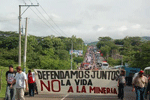Published on Tue, 2011-12-20 07:40
Hundreds of civil society organizations from all over the world are calling the World Bank and the International Centre for Settlement of Investment Disputes (ICSID), associate to the institution, to dismiss the demand of compensation initiated by Canadian company Pacific Rim against the Government of El Salvador, which forbade a cyanide-leach gold mining project presented by the firm. |
Published on Mon, 2011-12-19 14:20
The news has been filled with contention over Egypt’s November elections, but far less attention is being paid to the voting in Tunisia—also recently liberated from the rule of a dictator. In her analysis for Owni.eu and Government in the Lab magazine, Mary Elizabeth King recounted the democratization process and remarked the role of the Tunisian League for Human Rights, focal point of Social Watch in that country. |
Published on Fri, 2011-12-16 12:12
A growing number of US citizens raise their voices “demanding a new social contract” as the multiple world crises are increasing “poverty and income inequality at historic levels.” This unprecedented movement nurtures hope in a change of policies and behaviors “geared toward the well-being of Americans and the rest of the human race,” according to the US national contribution to the Social Watch Report 2012, launched last week. |
Published on Thu, 2011-12-15 08:27
The UN Committee on the Elimination of Discrimination against Women decided to conduct an inquiry into the murders and disappearances of Aboriginal women and girls across Canada. The decision was announced this week by Jeannette Corbiere Lavell, President of the Native Women’s Association of Canada (NWAC), and Sharon McIvor, of the Canadian Feminist Alliance for International Action (FAFIA, focal point of Social Watch in that North American country). |
SUSCRIBE TO OUR NEWSLETTER







